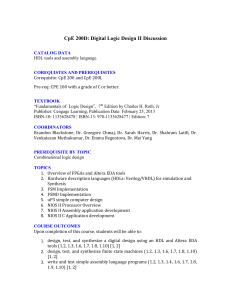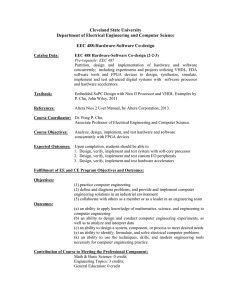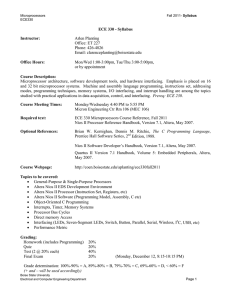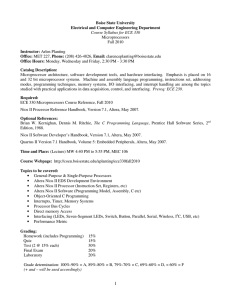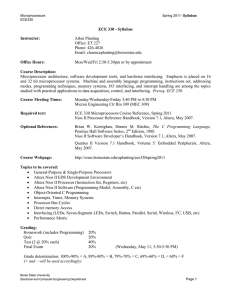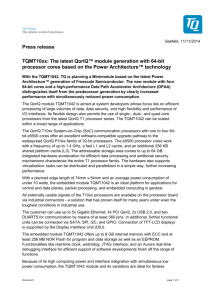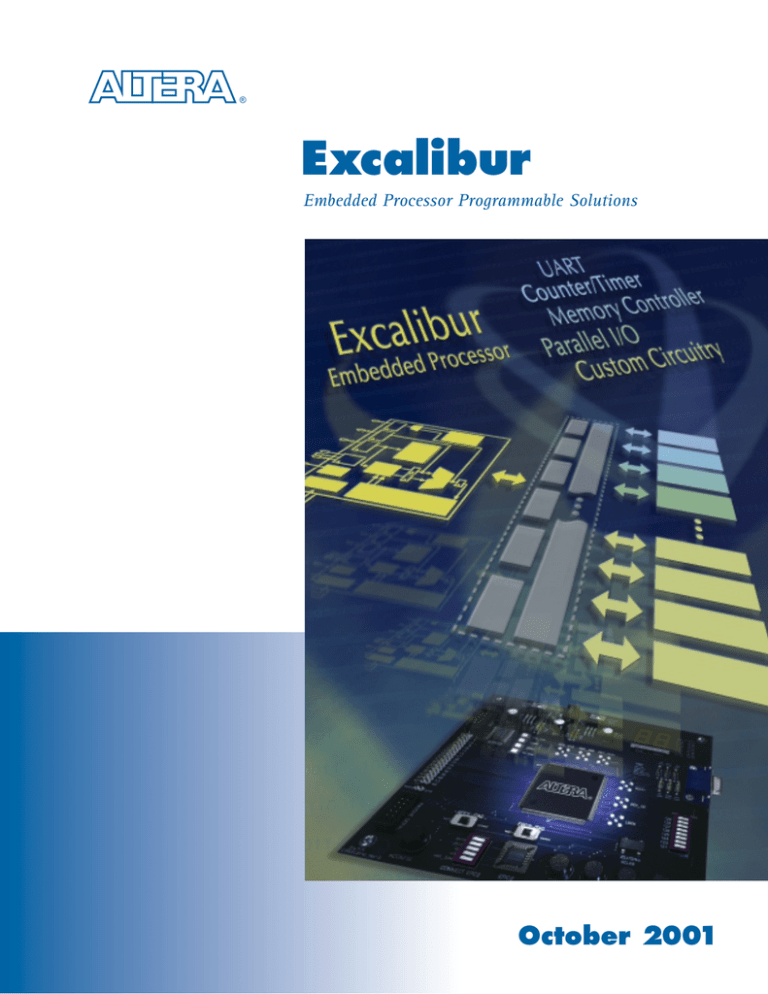
®
Excalibur
Embedded Processor Programmable Solutions
October 2001
Embedded Processors on a
Programmable Device
ARM-Based Excalibur Embedded
Processor Solutions
Altera® Excalibur™ embedded processor
solutions give you the tools you need to
integrate an entire system on a single
programmable logic device (PLD). By
combining programmable logic, memory,
and a processor core on one device, the Excalibur solutions
cut through the complexities of processor integration and
deliver the ease-of-use, fast development time, and low
non-recurring engineering (NRE) costs required for effective
embedded systems development. The Excalibur solutions
unite the advantages of programmable logic with the benefits
of open-access processor core technology. Not only do the
Excalibur products offer past ASIC users faster time-tomarket, programmable flexibility, and low-risk technology,
but they make low-cost, royalty-free access to advanced
processor technology available to all embedded system
designers. With the Excalibur technology, Altera introduces
new system-on-a-programmable-chip (SOPC) solutions for
your applications that require a fast, flexible development
platform for system integration.
Through partnership with ARM Ltd., Altera is
able to offer the ARM922T™ RISC processor
core embedded in the ARM-based Excalibur
devices. This high-performance hard processor core, combined with the advanced features of the
APEX™ 20KE device architecture, provides an outstanding
embedded system development platform.
The ARM-based devices consist of an embedded processor
stripe and programmable logic (shown in Figure 1). The
stripe contains the processor with its associated caches,
dual-port and single-port SRAM memories, peripherals,
and debug modules. An industry-standard AMBA™ highperformance bus (AHB) allows the processor stripe to
operate at up to 200 MHz. The stripe interfaces with the
device’s programmable logic via dedicated bus bridges
and dual-port RAM.
Figure 1. ARM-Based Excalibur Embedded Processor
Embedded Processor Core
Programmable Logic
PLD Flexibility with the Power of Embedded Processors
The Excalibur solutions help speed development and
shorten time-to-market for your embedded processor
applications by offering both the ARM®–based hard core
embedded processors and the Nios™ soft core embedded
processors. Combined with programmable logic and memory,
the Excalibur solutions give you all the programmable
flexibility you need with single-chip integration.
The advanced features of the Excalibur solutions include:
■
200-MHz high-performance RISC embedded processor
■
Support for a wide range of end applications
■
Integrated hardware and software development
workflow supported by:
- Quartus® II design software
- SOPC Builder system design tool
- Industry-standard EDA tools
- Real-time operating system (RTOS)
- Complete software tool chain with compiler,
debugger, linker, and assembler
■
Pre-licensed, off-the-shelf devices with no royalties
■
Optimized integration with Altera device architectures
The Excalibur solutions will expand as Altera introduces
more advanced embedded processors with higher performance and enhanced functionality.
Altera Corporation
On-Chip
RAM
JTAG/Debug
ARM
Embedded
Processor
Cache
External Devices
Serial Port
Altera
Programmable Logic
Architecture
External
Bus Interface
UART
Advanced Memory Configuration
An integrated SDRAM controller supports single data rate
(SDR) or double data rate (DDR) SDRAMs at up to 133 MHz
or 266 MHz respectively, and up to 512 Mbytes of external
SDRAM. The expansion bus interface (EBI) is compatible
with industry-standard flash memory, SRAMs, and memorymapped peripheral devices, directly supporting four devices
(up to 32 Mbytes each).
Several standard peripherals are implemented in the stripe,
including an interrupt controller, a universal asynchronous
receiver/transmitter (UART) and a general-purpose timer.
A watchdog timer is also provided for system checks.
High-Performance Architecture
The device logic is based on the APEX 20KE architecture
and offers all of the APEX 20KE device’s powerful systemlevel features, including embedded system blocks (ESBs),
support for a variety of I/O standards, and up to four
phase-locked loops (PLLs). The logic elements (LEs) and
ESBs in the logic portion of Excalibur devices can be used
to implement custom logic or intellectual property (IP)
functions from Altera’s extensive IP portfolio.
Figure 2. Nios Embedded Processor
The embedded processor, SDRAM controller, and the device
logic all have separate, independent clock domains with
individual PLLs that feature the enhanced ClockLock™ and
ClockBoost™ circuitry.
UART
CPU
User-Created
Logic
Excalibur devices can be configured in several ways: the
processor can configure the programmable logic from an
external flash memory, or the processor can reprogram the
configuration device (facilitating in-field upgrades). The
embedded processor can reconfigure the system at any time.
Custom
Instruction
Avalon Bus
Easy In-Field Upgrades
Serial I/O
Timer
On-Chip
RAM
On-Chip
ROM
SPI
Serial I/O
PIO
GeneralPurpose I/O
SDRAM
Controller
User-Defined
Port
SDRAM
User-Created
Logic
SRAM Flash
Integrated Hardware & Software Development
The Excalibur solutions feature a fully integrated hardware
and software development environment. The Quartus II
software offers extended support for PLD development.
Third-party compiler tools enable embedded software
development, and the Altera MegaWizard® Plug-In Manager
configures the embedded processor stripe and peripherals.
Third-party software for the Excalibur devices includes
the WindRiver Systems VxWorks AE RTOS, the ARM
Development Lite Suite (ADS) for ARM-based Excalibur
devices, and the Red Hat GNUPro software design suite.
Nios Embedded Processors
Altera’s Nios embedded processors, configurable RISC soft processors with 16-bit
instruction sets and user-selectable 16- or
32-bit data paths, are the first RISC soft processors to be
developed specifically for programmable logic. Delivered as
part of a complete, easy-to-use development kit, the Nios
embedded processors can be implemented in any of Altera's
ACEX™, FLEX®, APEX 20K, APEX II, Mercury™, or ARMbased Excalibur devices, simplifying the design process
and accelerating time-to-market.
Flexible & Configurable Processor
The Nios embedded processors include a library of standard
peripherals that allow you to customize the system to suit
your specific design requirements. Altera's SOPC Builder
system design tool provides an intuitive interface for
choosing and configuring the desired set of peripherals.
The SOPC Builder automatically generates the processor
system, custom software library, and simulation test bench
to further speed the development process and reduce
time-to-market.
A number of peripherals are available for the Nios embedded
processor including:
■
Timer/counter
■
UART
■
Parallel input/output (PIO)
■
Serial peripheral interface (SPI)
Programmable Logic Device
■
Ethernet
■
Direct memory access (DMA)
■
On-chip debug
■
Internal memory (RAM and ROM)
■
External memory interfaces (SDRAM, SRAM, SSRAM,
and flash)
You can also add your own peripherals to the Nios library.
The added peripherals then appear as menu choices within
the SOPC Builder design tool.
Customizable Instruction Set
Nios developers can accelerate time-critical software
algorithms by adding custom instructions to the Nios
instruction set. Custom instructions can reduce the time to
perform complex, application-specific tasks to a single
instruction, dramatically improving system performance.
Custom instructions can access external memory and logic
to further extend the design’s capability in applications
such as digital signal processing (DSP) and packet header
processing. The SOPC Builder design tool automatically adds
user-designed custom instruction units to the Nios processor
and generates C and assembly language macros for use by
your software development team.
Bus Architecture for High-Throughput Applications
The Nios multi-master Avalon™ bus supports high-bandwidth
applications, allowing you to virtually eliminate data flow
bottlenecks within your system designs. The multi-master
Avalon bus provides an infrastructure that allows simultaneous transactions by multiple bus masters, providing the
gigabit throughput performance levels necessary for highspeed communications and data storage developers.
The simultaneous multi-master Avalon bus eliminates the
need for processors to be involved in every data transaction.
Instead, the Nios embedded processor can act as a traffic
manager, directing data flow to optimize system throughput.
Altera Corporation
Each bus master resides on its own dedicated Avalon bus and
can share peripherals with other masters through slave-side
arbitration, eliminating bus-contention issues. You can select
from several arbitration schemes, including priority-based,
round-robin, or your own custom logic.
Ideal for a Wide Range of Applications
With the addition of IP functions, you can develop finite
impulse response (FIR) filters, fast Fourier transforms (FFTs),
and complete DSP systems. You can create industrial or
automotive controllers by combining the Nios embedded
processor with time processing units. By connecting media
access controllers, error correction systems, or packetprocessing modules, you can build complete network
processing systems. Since the processors occupy only a small
part of the device, several Nios embedded processors can
fit onto one Altera PLD, giving you the design power you
need for your most demanding applications. This multiprocessor capability is especially useful in I/O-intensive
applications such as networking and telecommunications.
■
GNUPro compiler, assembler, and debugger by Cygnus
Software (a division of Red Hat Inc.)
■
Development board with an APEX EP20K200E device
■
Example reference designs
Additional accessory kits are available for the Nios
development kit that provide support for Ethernet, PCI,
and Linux development.
Figure 3. Excalibur Development Kit, Featuring Nios
Obsolescence-Proof Processor
The Nios embedded processor requires no license or royalty
fees—you may create an unlimited number of Nios designs
targeted for Altera devices. Since the Nios embedded
processor supports the entire range of Altera look-up table
(LUT) devices, your Nios designs can migrate to any LUT or
mask-programmable logic device (MPLD) to take advantage
of cost and performance benefits.
Complete Development Kit
The Excalibur development kit, featuring the Nios
embedded processor (Figure 3), includes everything
necessary to develop your own SOPC solution:
■
Nios embedded processor and peripherals
■
SOPC Builder design tool
■
Quartus II Limited Edition development software
Altera SOPC Solutions
With the Excalibur high-performance embedded processors,
Altera adds to its wide range of SOPC solutions. The
advanced features, extensive tool support, and sophisticated
debug environments of the Nios and ARM-based Excalibur
products allow engineers to integrate an entire system on
a single PLD with the ease-of-use and decreased time-tomarket required for next-generation applications.
For full details of kits, parts, and availability, contact your
local Altera sales representative, or visit the Altera web
site at http://www.altera.com.
Altera Offices
Altera Corporation
101 Innovation Drive
San Jose, CA 95134
USA
Tel: (408) 544-7000
http://www.altera.com
Altera European Headquarters
Holmers Farm Way
High Wycombe
Buckinghamshire
HP12 4XF
United Kingdom
Tel: (44) 1 494 602 000
Altera Japan, Ltd.
Shinjuku i-Land Tower 32F
5-1, Nishi-Shinjuku, 6-Chome
Shinjuku-ku, Tokyo 163-1332
Japan
Tel: (81) 3 3340 9480
http://www.altera.com/japan
Altera International, Ltd.
2102 Tower 6
The Gateway, Harbour City
9 Canton Road,
Tsimshatsui Kowloon
Hong Kong
Tel: (852) 2945 7000
Copyright © 2001 Altera Corporation. Altera, The Programmable Solutions Company, the stylized Altera logo, specific device designations, and all other words and logos that are identified as
trademarks and/or service marks are, unless noted otherwise, the trademarks and service marks of Altera Corporation in the U.S. and other countries. Other brands or products are trademarks
of their respective holders, specifically: ARM and the ARM Powered logo are registered trademarks of ARM Limited. All other product or service names are the property of their respective holders.
All rights reserved.
M-GB-EXCALIBUR-03

